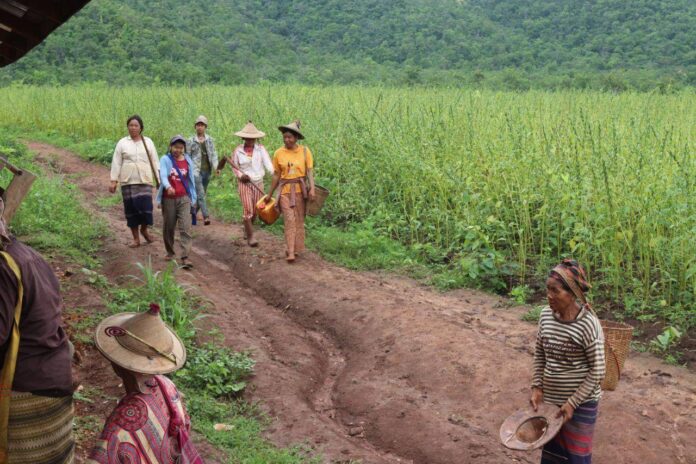By Kantarawaddy Times
In a village in the eastern part of Dee Maw Hso Township, Karenni State, residents who previously fled due to conflict have returned. However, they are only engaging in minimal farming activities due to ongoing concerns about the possibility of being displaced again, according to local sources.
A local man informed the Kantarawaddy Times that while residents have begun to resume farming, they remain anxious about their safety, particularly due to the threat of artillery shelling and airstrikes by the State Administration Council.
“When they return to work on their fields, farmers don’t feel secure. If fighter jets appear, they have to run back quickly. Even though they want to farm more, the fear of having to flee again at any moment prevents them from doing so. After fleeing, they often lack the seeds or resources needed to restart. They are facing various challenges,” he explained.
The villagers have been purchasing seeds from nearby villages and sharing them among themselves. While some farmers have access to land, they struggle to purchase seeds.
Others who can afford seeds do not have land to farm. As a result, they focus on subsistence farming and share what they can with each other.
Currently, they are mostly working on fields close to the village. Despite some crop yield, heavy rainfall has caused damage, according to a local woman.
“This year, we can only cultivate a small plot of sesame. There isn’t much land in the village for large-scale sesame farming. In previous years, we used to farm a little farther from the village, but we can’t do that now due to security concerns. Some fields in the village that are near where the military stayed have mines, so we don’t dare to farm there. The sesame seemed to be doing well, but now, with the heavy rain, it’s all ruined. The groundnuts haven’t fared well either. Only the paddy has done well,” she said.
Last year, due to the ongoing conflict in the area, farmers were unable to work on their fields. They only resumed farming this year. If this year’s crop yields are not productive, it could lead to a shortage of seeds for next year’s planting, according to local sources.
The villagers primarily cultivate sesame, groundnuts, paddy, and maize for their livelihoods.




